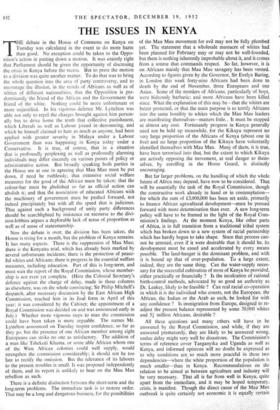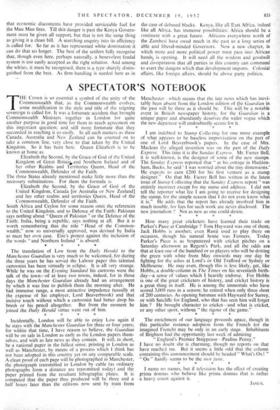THE ISSUES IN KENYA
THE debate in the House of Commons on Kenya on Tuesday was calculated in the event to do more harm than good. No exception could be taken to the Oppo- sition's action in putting down a motion. It was entirely right that Parliament should be given the opportunity of discussing the crisis in Kenya before the recess. But to press the motion to a division was quite another matter. To do that was to bring the whole question into the area of party controversy, and to encourage the illusion, in the minds of Africans as well as of whites of different nationalities, that the Opposition is pre- dominantly the Friend of the African and the Government the friend of the white. Nothing could be more unfortunate or more unjustified. In his vigorous defence Mr. Lyttelton was able not only to repel the charges brought against him person- ally but to drive home the truth that collective punishment, which Liberals as well as Labour joined in denouncing, and which he himself claimed to hate as much as anyone, had been applied with greater severity in Malaya under a Labour Government than was happening in Kenya today under a Conservative. It is, true, of course, that in a. situation that is profoundly perplexing as well as profoundly alarming individuals may differ sincerely on various points of policy or administrative action. But broadly speaking both parties in the House are at one in agreeing that Mau Mau must be put down, if need be ruthlessly; that extensive social welfare measures for the good of the African must be taken; that the colour-bar must be abolished so far as official action can abolish it; and that the association of educated Africans with the machinery of government must be pushed forward, not indeed precipitately but with all the speed that is judicious. That against such a background of unity party differences should be searchlighted by insistence on recourse to the divi- sion-lobbies argues a deplorable lack of sense of proportion as well as of sense of statesmanship.
Now the debate is over, the division has been taken, the House is rising for a month, but the problem of Kenya remains. It has many aspects. There is the suppression of Mau Mau; there is the Kenyatta trial, which has already been marked by several unfortunate incidents; there is the protection of peace- ful whites and Africans; there is progress in the essential welfare measures, including education. Part of this is long-term, and must wait the report of the Royal Commission, whose member- ship is not even yet complete. (Here the Colonial Secretary's defence against the charge of delay, made in these columns as elsewhere, was on the whole convincing; Sir Philip Mitchell's despatch, after necessary discussion by the East African High Commission, reached him in its final form in April of this year; it was considered by the Cabinet; the appointment of a Royal Commission was decided on and was announced early in July.) Whether more vigorous steps to man the commission could have been taken is more arguable. The names Mr. Lyttelton announced on Tuesday inspire confidence, so far as they go, but the presence of one African member among eight Europeans can strike no one as satisfactory. The addition of a man like Tshekedi Khama, or some able. African whom one of the West African colonies could well supply, would strengthen the commission considerably; it should not be too late to rectify the omission. But the relevance of its labours to the present troubles is small. It was proposed independently of them, and its report is unlikely to bear on the Mau Mau rebellion as such.
There is a definite distinction between the short-term and the long-term problems. The immediate task is to restore order. That may be a long and dangerous business, for the possibilities of the Mau Mau movement for evil may not -be fully plumbed yet. The statement that a wholesale massacre of whites had been planned for February may or may not be well-founded, but there is nothing inherently improbable about it, and it comes from a source that commands respect. So far, however, it is on Africans mainly that Mau Mau savagery has been vented. According to figures given by the Governor, Sir Evelyn Baring, in London this week forty-nine Africans had been done to death by the end of November, three Europeans and one Asian. Some of the murders of Africans, particularly of boys, were hideously barbaric; and more Africans have been killed since. What the explanation of this may be—that the whites are better protected, or that the main purpose is to terrify Africans into the same hostility to whites which the Mau Mau leaders are manifesting themselves—matters little._ It must be stopped at almost any cost. Fortunately progress in Kenya generally need not be held up meanwhile, for the Kikuyu represent no very large proportion of the Africans of Kenya (about one in five) and no large-proportion of the Kikuyu have voluntarily identified themselves with Mau Mau. Many of them, it is true, have been terrorised into that, but the extent to which Kikuyu are actively opposing the movement, at real danger to them- selves, by enrolling in the Home Guard, is distinctly encouraging.
But far larger problems, on the handling of which the whole future of Africa may depend, have now to be considered. That will be essentially the task of the Royal Commission, though the constructive work already in hand or in contemplation— for which the sum of £3,000,000 has been set aside, primarily to finance African agricultural development—must be pressed forward with more determination than ever. A new long-term policy will have to be framed in the light of the Royal Com- mission's findings. At the moment Kenya, like other parts of Africa, is in full transition from a traditional tribal system which has broken down to a new system of racial partnership which has hardly begun to take shape. Since that process can- not be arrested, even if it were desirable that it should be, its development must be eased and accelerated by every means possible. The land-hunger is the dominant problem, and with it is bound up that of over-population. To a large extent, indeed, they are the same thing. Can the water-supply neces- sary for the successful cultivation of most of Kenya be provided, either practically or financially ? Is the inculcation of rational birth-control methods, advocated by so good an authority as Dr. Leakey, likely to be feasible ? Can real racial co-operation in which it is the individual who counts, not the European, the African, the Indian or the Arab as such, be looked for with any confidence ? Is immigration from Europe, designed to re- adjust the present balance represented by some 30,000 whites and 54 million Africans, desirable ?
All these questions and many others will have to be answered by the Royal Commission, and while, if they are answered prematurely, they are likely to be answered wrong, undue delay might very well be disastrous. The Commission's terms of reference cover Tanganyika and Uganda as well as Kenya, and informed opinions will no doubt be expressed as to why conditions are so much more peaceful in these two dependencies—where the white proportion of the population is much smaller—than in Kenya. Recommendations on the relation to be aimed at between agriculture and industry will be very necessary. _That all is far from well in Kenya, quite apart from the immediate, and it may be hoped temporary, crisis, is manifest. Though the direct cause of the Mau Mau outbreak is quite certainly not economic it is equally certain that economic discontents have provided serviceable fuel for the Mau Mau fires. Till this danger is past the Kenya Govern- ment must be given all support, but that is not the sanie thing as giving it a clean bill. A searching enquiry into its efficiency is called for. So far as it has represented white domination it can do that no longer. The best of the settlers fully recognise that, though even here, perhaps naturally, a benevolent feudal system is too easily accepted as the right solution. And among the whites, it must be recognised, there is a type sharply distin- guished from the best. As firm- handling is needed here as in the case of debased blacks. Kenya, like all East Africa, indeed like all Africa, has immense possibilities; Africa should be a continent with a great future. Africans everywhere north of the Zambesi have owed much in the past to a long series of able and liberal-minded Governors. Now a new chapter, in which more and more political power must pass into African hands is opening. It will need all the wisdom and goodwill and co-operation that all parties in this country can command to avert the dangers which that development imports. Colonial affairs, like foreign affairs, should be above party politics.



































 Previous page
Previous page